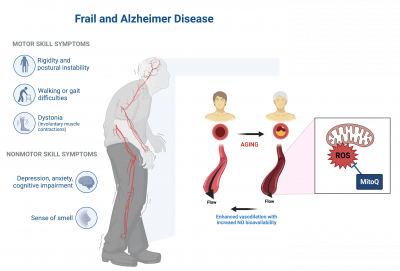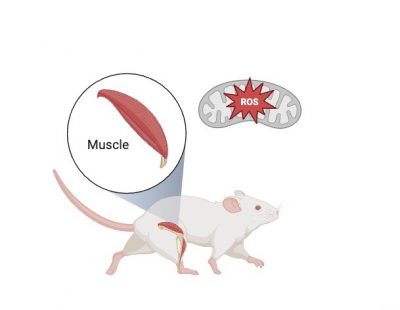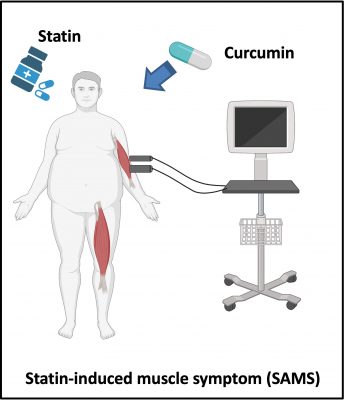Research Statement
Current research interests of Kwon's lab include an integrative approach to the study of vascular and skeletal muscle function in both animal and human models. Specifically, we are interested in identifying the role of oxidative stress and mitochondrial dysfunction on skeletal muscle and vasculatures with aging and age-related diseases such as chronic obstructive pulmonary disease, heart failure, and hypertension. To undertake mechanistic studies, our lab employs a wide array of techniques (Permeablized mitochondrial respiration, Isolated vessel pressure myography, Electron paramagnetic resonance spectroscopy, Ultrasound doppler, and a host of molecular and cellular biology techniques) with the goal of achieving an integrative view of muscle, vascular, and pathophysiology.
Areas of Expertise:
Our research topics range from the study of cells and rodents to human and from basic science and molecular science to clinical science in the skeletal muscle and vascular physiology. Utilizing an integrative approach that combines in–vivo and in–vitro techniques, our research focuses on examining the impact of oxidative stress and mitochondria dysfunction on skeletal muscle and vasculatures with advancing age and skeletal muscle and cardiovascular diseases.
The Mito-Frail Trial: Effects of MitoQ on Vasodilation, Mobility and Cognitive Performance in Frail Older Adults

We have recently shown that MitoQ, a mitochondria-targeted antioxidant known to improve endothelial function and Nitric Oxide (NO) bioavailability, may also restore impaired flow-mediated vasodilation in frail older adults, enhancing gait speed. In the Mito-Frail study we now wish to explore the hypothesis that MitoQ attenuates aging- related declines in flow-mediated vasodilation involving both peripheral and cerebral blood vessels. At the same time, we will obtain feasibility and pilot data involving measures of physical mobility and cognitive performance that may help us design and power a future clinical trial. Ultimately, we seek to develop strategies for preventing or slowing the progression of Alzheimer's disease and the vascular contribution to dementia.
NIH K01-KAG080164A (PI- Kwon, Oh Sung) 5/01/2023 – 4/30/2028
Translational strategies for optimizing musculoskeletal recovery after ACL injury

Anterior cruciate ligament (ACL) tears result in significant quadriceps muscle atrophy that is resistant to recovery despite extensive rehabilitation. Recent work demonstrated that ACL injury occurs mitochondrial dysfunction and mitochondrial-derived oxidative stress in the quadriceps muscle , which may limit recovery. In addition, ACL tears may be at an increased risk for cardiovascular diseases. Former players who sustained ACL tears showed the increased risk of heart attack and atherosclerosis. Therefore, elucidating the mechanisms in the progression of skeletal and vascular dysfunction is critical for developing new treatment strategies.
NIH 1R01AR081235-1 (PI- Lepley, Lindsey, Co-I- Kwon, Oh Sung) 8/31/2022 – 8/30/2026
Curcumin as a nutraceutical treatment for statin-associated muscle symptoms (SAMS)

Hydroxy-methyl-glutaryl Coenzyme A reductase inhibitors (statins) are among the most effective drugs for reducing low-density lipoprotein cholesterol (LDL-C) and cardiovascular disease (CVD) morbidity and mortality. Despite their potency and cost-effectiveness, statins are underutilized, with 50% of high-risk statin-eligible patients currently untreated and adherence rates as low as 30-40% after the first year of treatment. Seventy five percent of statin users with poor statin adherence and discontinuation report the reason for their intolerance as statin-associated muscle symptoms (SAMS) which encompass a range of symptoms including muscle aching, pain and stiffness. Pharmacological treatments for SAMS are very limited, with data from randomized clinical trials inconclusive as to the effectiveness of any treatment. Curcumin is a natural dietary polyphenol with a range of pharmacological properties that produce antioxidant, anti-inflammatory and analgesic effects. Curcumin supplementation reduces muscle damage, atrophy and pain associated with osteoarthritis, rheumatoid arthritis, acute injury, and fibromyalgia. We hypothesize that curcumin will reduce SAMS, as measured by symptom severity and muscle oxygenation, and that patients using statins and curcumin will also demonstrate an improved blood lipid profile relative to the placebo group.
CONS01037-Hatch Capacity Grant National Institute of Food and Agriculture (NIFA) (PI-Kwon, Oh Sung) 10/01/2020-09/30/2024